Analysis of Global Managerial Mindset and Influencing Factors
VerifiedAdded on 2022/10/10
|11
|2215
|151
Report
AI Summary
This report delves into the critical elements that shape a global managerial mindset and its profound impact on international business strategies. It examines the significance of cognitive, affective, and interpersonal skills in fostering effective decision-making within international organizations. The report explores how a global mindset influences strategizing in areas such as foreign direct investment, foreign market entry modes, and international competition. It reviews the existing literature, highlighting the importance of adapting to cultural differences, fostering cross-cultural communication, and building trust among stakeholders. The study emphasizes the role of cognitive abilities in understanding business procedures, affective commitment in aligning with organizational values, and interpersonal skills in building relationships and communication. The analysis also covers how these factors influence strategies for international competition and the selection of foreign market entry modes. This report provides a comprehensive overview of how a global mindset contributes to the success and profitability of international business operations.
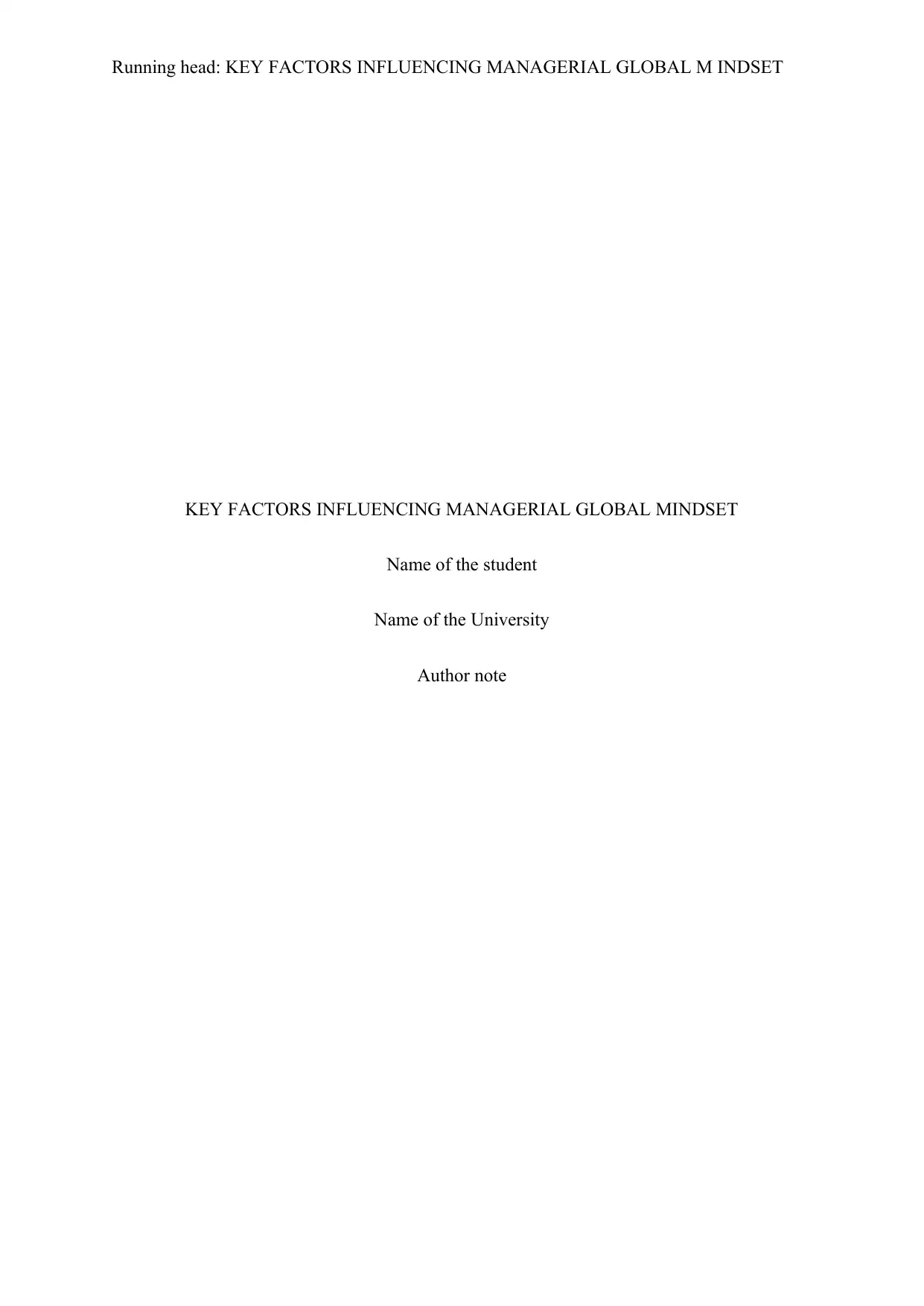
Running head: KEY FACTORS INFLUENCING MANAGERIAL GLOBAL M INDSET
KEY FACTORS INFLUENCING MANAGERIAL GLOBAL MINDSET
Name of the student
Name of the University
Author note
KEY FACTORS INFLUENCING MANAGERIAL GLOBAL MINDSET
Name of the student
Name of the University
Author note
Paraphrase This Document
Need a fresh take? Get an instant paraphrase of this document with our AI Paraphraser
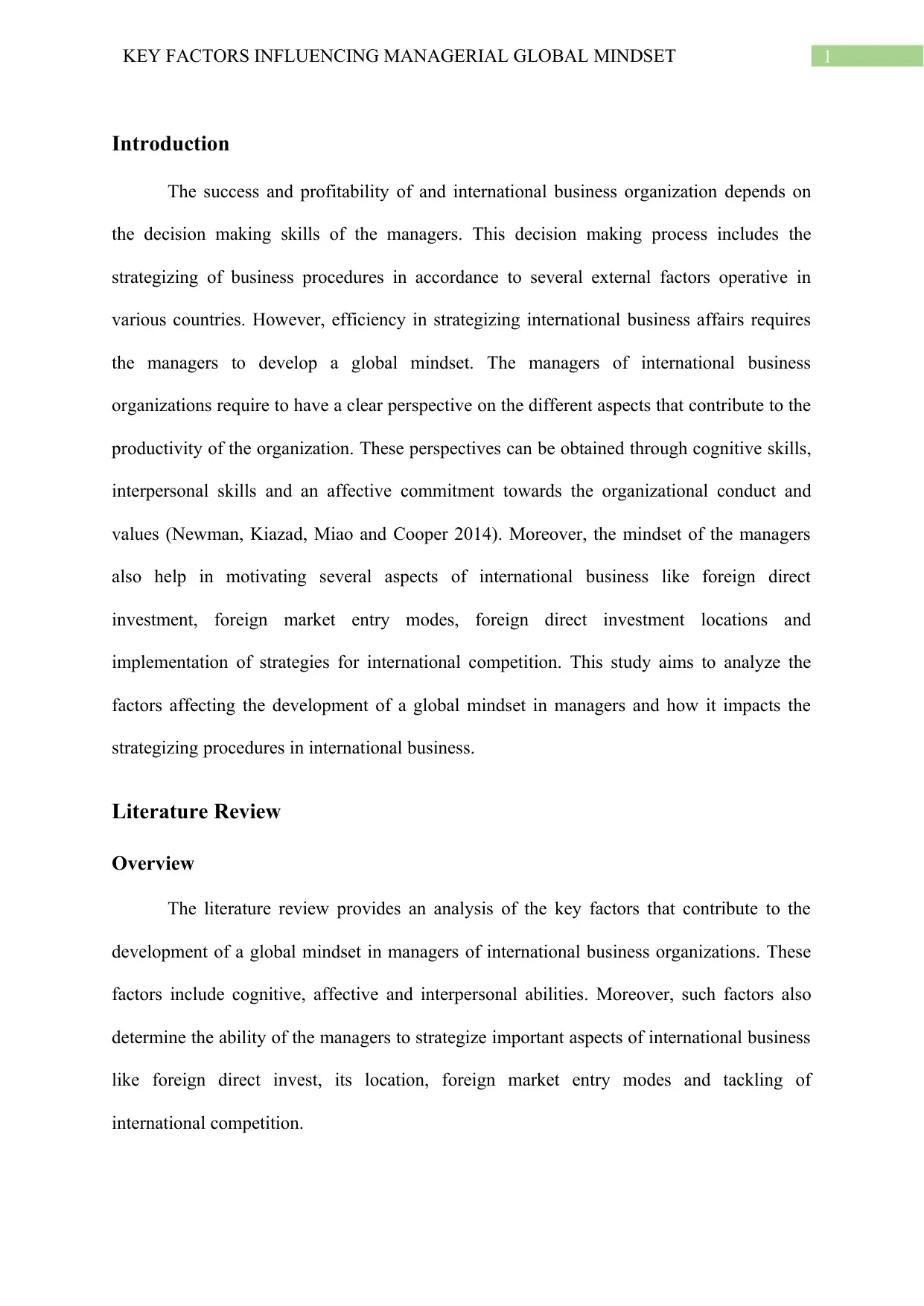
1KEY FACTORS INFLUENCING MANAGERIAL GLOBAL MINDSET
Introduction
The success and profitability of and international business organization depends on
the decision making skills of the managers. This decision making process includes the
strategizing of business procedures in accordance to several external factors operative in
various countries. However, efficiency in strategizing international business affairs requires
the managers to develop a global mindset. The managers of international business
organizations require to have a clear perspective on the different aspects that contribute to the
productivity of the organization. These perspectives can be obtained through cognitive skills,
interpersonal skills and an affective commitment towards the organizational conduct and
values (Newman, Kiazad, Miao and Cooper 2014). Moreover, the mindset of the managers
also help in motivating several aspects of international business like foreign direct
investment, foreign market entry modes, foreign direct investment locations and
implementation of strategies for international competition. This study aims to analyze the
factors affecting the development of a global mindset in managers and how it impacts the
strategizing procedures in international business.
Literature Review
Overview
The literature review provides an analysis of the key factors that contribute to the
development of a global mindset in managers of international business organizations. These
factors include cognitive, affective and interpersonal abilities. Moreover, such factors also
determine the ability of the managers to strategize important aspects of international business
like foreign direct invest, its location, foreign market entry modes and tackling of
international competition.
Introduction
The success and profitability of and international business organization depends on
the decision making skills of the managers. This decision making process includes the
strategizing of business procedures in accordance to several external factors operative in
various countries. However, efficiency in strategizing international business affairs requires
the managers to develop a global mindset. The managers of international business
organizations require to have a clear perspective on the different aspects that contribute to the
productivity of the organization. These perspectives can be obtained through cognitive skills,
interpersonal skills and an affective commitment towards the organizational conduct and
values (Newman, Kiazad, Miao and Cooper 2014). Moreover, the mindset of the managers
also help in motivating several aspects of international business like foreign direct
investment, foreign market entry modes, foreign direct investment locations and
implementation of strategies for international competition. This study aims to analyze the
factors affecting the development of a global mindset in managers and how it impacts the
strategizing procedures in international business.
Literature Review
Overview
The literature review provides an analysis of the key factors that contribute to the
development of a global mindset in managers of international business organizations. These
factors include cognitive, affective and interpersonal abilities. Moreover, such factors also
determine the ability of the managers to strategize important aspects of international business
like foreign direct invest, its location, foreign market entry modes and tackling of
international competition.
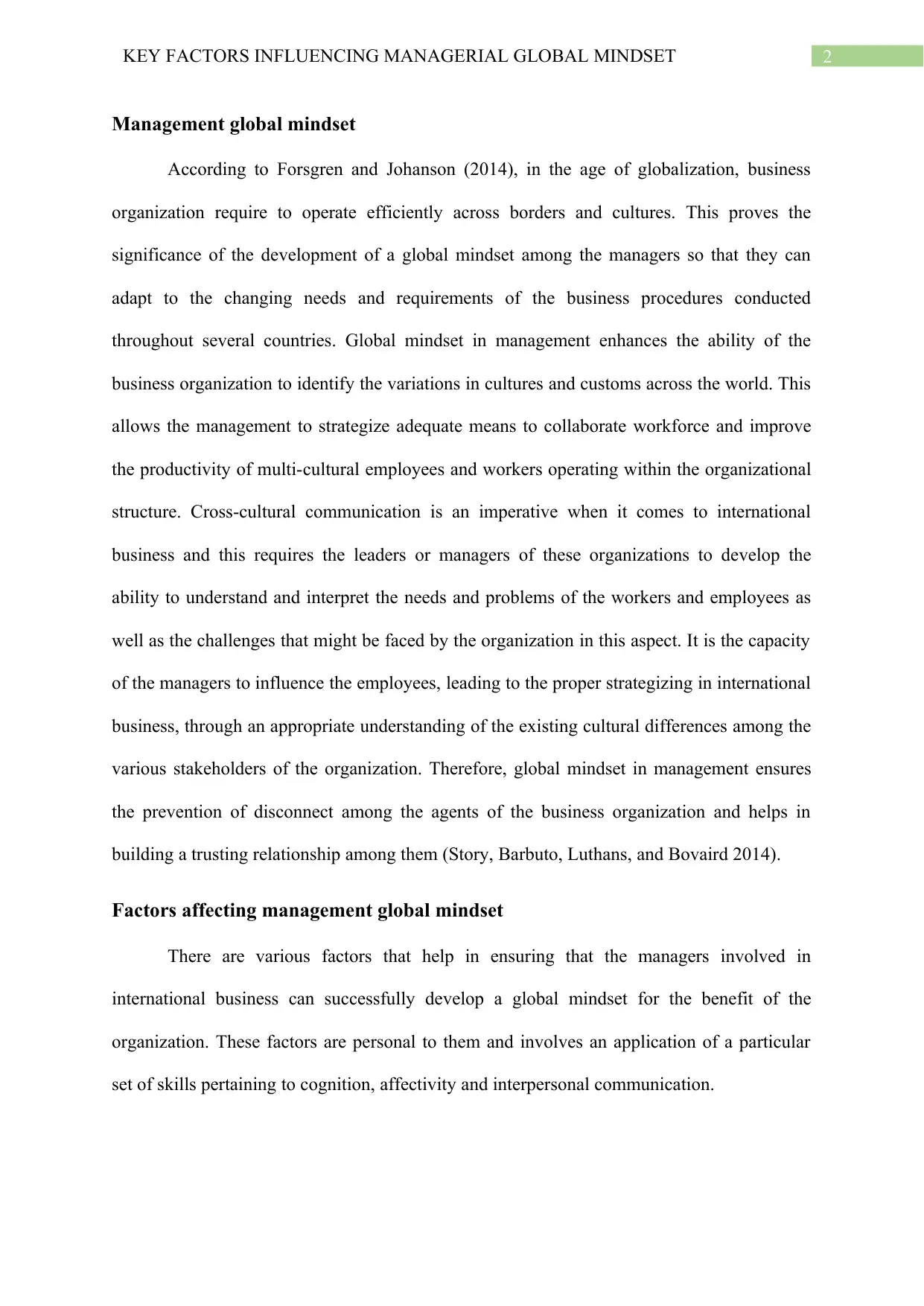
2KEY FACTORS INFLUENCING MANAGERIAL GLOBAL MINDSET
Management global mindset
According to Forsgren and Johanson (2014), in the age of globalization, business
organization require to operate efficiently across borders and cultures. This proves the
significance of the development of a global mindset among the managers so that they can
adapt to the changing needs and requirements of the business procedures conducted
throughout several countries. Global mindset in management enhances the ability of the
business organization to identify the variations in cultures and customs across the world. This
allows the management to strategize adequate means to collaborate workforce and improve
the productivity of multi-cultural employees and workers operating within the organizational
structure. Cross-cultural communication is an imperative when it comes to international
business and this requires the leaders or managers of these organizations to develop the
ability to understand and interpret the needs and problems of the workers and employees as
well as the challenges that might be faced by the organization in this aspect. It is the capacity
of the managers to influence the employees, leading to the proper strategizing in international
business, through an appropriate understanding of the existing cultural differences among the
various stakeholders of the organization. Therefore, global mindset in management ensures
the prevention of disconnect among the agents of the business organization and helps in
building a trusting relationship among them (Story, Barbuto, Luthans, and Bovaird 2014).
Factors affecting management global mindset
There are various factors that help in ensuring that the managers involved in
international business can successfully develop a global mindset for the benefit of the
organization. These factors are personal to them and involves an application of a particular
set of skills pertaining to cognition, affectivity and interpersonal communication.
Management global mindset
According to Forsgren and Johanson (2014), in the age of globalization, business
organization require to operate efficiently across borders and cultures. This proves the
significance of the development of a global mindset among the managers so that they can
adapt to the changing needs and requirements of the business procedures conducted
throughout several countries. Global mindset in management enhances the ability of the
business organization to identify the variations in cultures and customs across the world. This
allows the management to strategize adequate means to collaborate workforce and improve
the productivity of multi-cultural employees and workers operating within the organizational
structure. Cross-cultural communication is an imperative when it comes to international
business and this requires the leaders or managers of these organizations to develop the
ability to understand and interpret the needs and problems of the workers and employees as
well as the challenges that might be faced by the organization in this aspect. It is the capacity
of the managers to influence the employees, leading to the proper strategizing in international
business, through an appropriate understanding of the existing cultural differences among the
various stakeholders of the organization. Therefore, global mindset in management ensures
the prevention of disconnect among the agents of the business organization and helps in
building a trusting relationship among them (Story, Barbuto, Luthans, and Bovaird 2014).
Factors affecting management global mindset
There are various factors that help in ensuring that the managers involved in
international business can successfully develop a global mindset for the benefit of the
organization. These factors are personal to them and involves an application of a particular
set of skills pertaining to cognition, affectivity and interpersonal communication.
⊘ This is a preview!⊘
Do you want full access?
Subscribe today to unlock all pages.

Trusted by 1+ million students worldwide
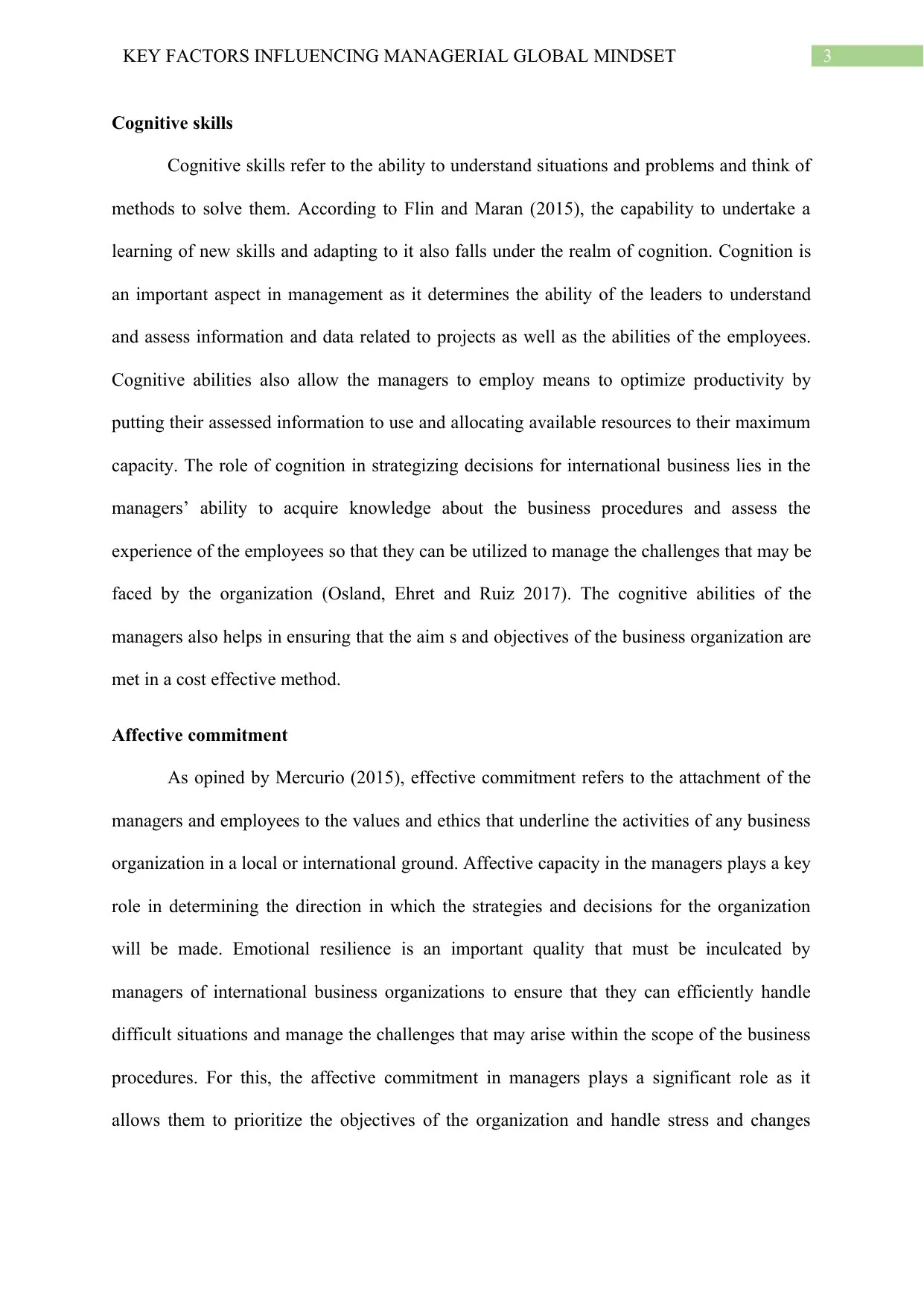
3KEY FACTORS INFLUENCING MANAGERIAL GLOBAL MINDSET
Cognitive skills
Cognitive skills refer to the ability to understand situations and problems and think of
methods to solve them. According to Flin and Maran (2015), the capability to undertake a
learning of new skills and adapting to it also falls under the realm of cognition. Cognition is
an important aspect in management as it determines the ability of the leaders to understand
and assess information and data related to projects as well as the abilities of the employees.
Cognitive abilities also allow the managers to employ means to optimize productivity by
putting their assessed information to use and allocating available resources to their maximum
capacity. The role of cognition in strategizing decisions for international business lies in the
managers’ ability to acquire knowledge about the business procedures and assess the
experience of the employees so that they can be utilized to manage the challenges that may be
faced by the organization (Osland, Ehret and Ruiz 2017). The cognitive abilities of the
managers also helps in ensuring that the aim s and objectives of the business organization are
met in a cost effective method.
Affective commitment
As opined by Mercurio (2015), effective commitment refers to the attachment of the
managers and employees to the values and ethics that underline the activities of any business
organization in a local or international ground. Affective capacity in the managers plays a key
role in determining the direction in which the strategies and decisions for the organization
will be made. Emotional resilience is an important quality that must be inculcated by
managers of international business organizations to ensure that they can efficiently handle
difficult situations and manage the challenges that may arise within the scope of the business
procedures. For this, the affective commitment in managers plays a significant role as it
allows them to prioritize the objectives of the organization and handle stress and changes
Cognitive skills
Cognitive skills refer to the ability to understand situations and problems and think of
methods to solve them. According to Flin and Maran (2015), the capability to undertake a
learning of new skills and adapting to it also falls under the realm of cognition. Cognition is
an important aspect in management as it determines the ability of the leaders to understand
and assess information and data related to projects as well as the abilities of the employees.
Cognitive abilities also allow the managers to employ means to optimize productivity by
putting their assessed information to use and allocating available resources to their maximum
capacity. The role of cognition in strategizing decisions for international business lies in the
managers’ ability to acquire knowledge about the business procedures and assess the
experience of the employees so that they can be utilized to manage the challenges that may be
faced by the organization (Osland, Ehret and Ruiz 2017). The cognitive abilities of the
managers also helps in ensuring that the aim s and objectives of the business organization are
met in a cost effective method.
Affective commitment
As opined by Mercurio (2015), effective commitment refers to the attachment of the
managers and employees to the values and ethics that underline the activities of any business
organization in a local or international ground. Affective capacity in the managers plays a key
role in determining the direction in which the strategies and decisions for the organization
will be made. Emotional resilience is an important quality that must be inculcated by
managers of international business organizations to ensure that they can efficiently handle
difficult situations and manage the challenges that may arise within the scope of the business
procedures. For this, the affective commitment in managers plays a significant role as it
allows them to prioritize the objectives of the organization and handle stress and changes
Paraphrase This Document
Need a fresh take? Get an instant paraphrase of this document with our AI Paraphraser
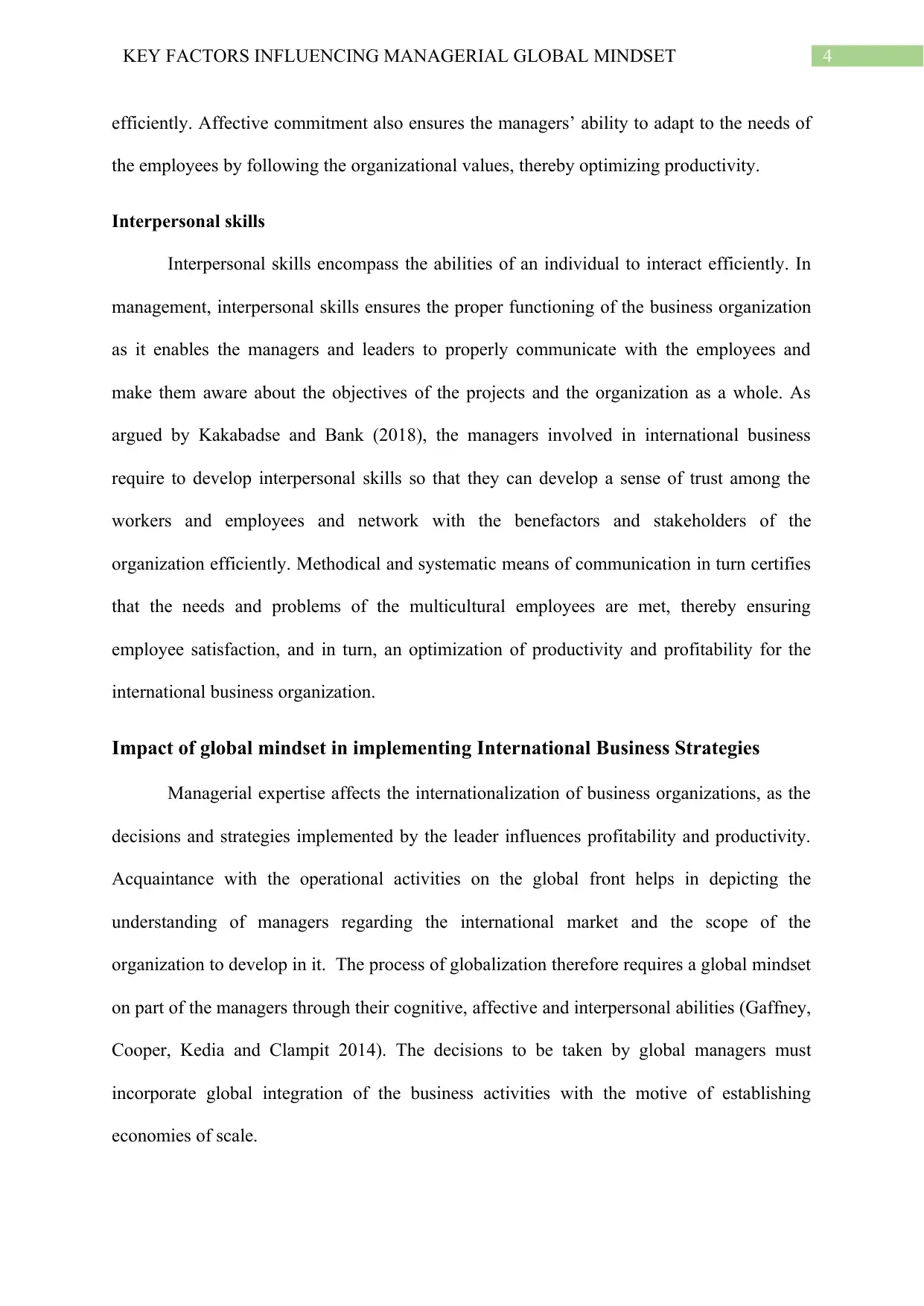
4KEY FACTORS INFLUENCING MANAGERIAL GLOBAL MINDSET
efficiently. Affective commitment also ensures the managers’ ability to adapt to the needs of
the employees by following the organizational values, thereby optimizing productivity.
Interpersonal skills
Interpersonal skills encompass the abilities of an individual to interact efficiently. In
management, interpersonal skills ensures the proper functioning of the business organization
as it enables the managers and leaders to properly communicate with the employees and
make them aware about the objectives of the projects and the organization as a whole. As
argued by Kakabadse and Bank (2018), the managers involved in international business
require to develop interpersonal skills so that they can develop a sense of trust among the
workers and employees and network with the benefactors and stakeholders of the
organization efficiently. Methodical and systematic means of communication in turn certifies
that the needs and problems of the multicultural employees are met, thereby ensuring
employee satisfaction, and in turn, an optimization of productivity and profitability for the
international business organization.
Impact of global mindset in implementing International Business Strategies
Managerial expertise affects the internationalization of business organizations, as the
decisions and strategies implemented by the leader influences profitability and productivity.
Acquaintance with the operational activities on the global front helps in depicting the
understanding of managers regarding the international market and the scope of the
organization to develop in it. The process of globalization therefore requires a global mindset
on part of the managers through their cognitive, affective and interpersonal abilities (Gaffney,
Cooper, Kedia and Clampit 2014). The decisions to be taken by global managers must
incorporate global integration of the business activities with the motive of establishing
economies of scale.
efficiently. Affective commitment also ensures the managers’ ability to adapt to the needs of
the employees by following the organizational values, thereby optimizing productivity.
Interpersonal skills
Interpersonal skills encompass the abilities of an individual to interact efficiently. In
management, interpersonal skills ensures the proper functioning of the business organization
as it enables the managers and leaders to properly communicate with the employees and
make them aware about the objectives of the projects and the organization as a whole. As
argued by Kakabadse and Bank (2018), the managers involved in international business
require to develop interpersonal skills so that they can develop a sense of trust among the
workers and employees and network with the benefactors and stakeholders of the
organization efficiently. Methodical and systematic means of communication in turn certifies
that the needs and problems of the multicultural employees are met, thereby ensuring
employee satisfaction, and in turn, an optimization of productivity and profitability for the
international business organization.
Impact of global mindset in implementing International Business Strategies
Managerial expertise affects the internationalization of business organizations, as the
decisions and strategies implemented by the leader influences profitability and productivity.
Acquaintance with the operational activities on the global front helps in depicting the
understanding of managers regarding the international market and the scope of the
organization to develop in it. The process of globalization therefore requires a global mindset
on part of the managers through their cognitive, affective and interpersonal abilities (Gaffney,
Cooper, Kedia and Clampit 2014). The decisions to be taken by global managers must
incorporate global integration of the business activities with the motive of establishing
economies of scale.
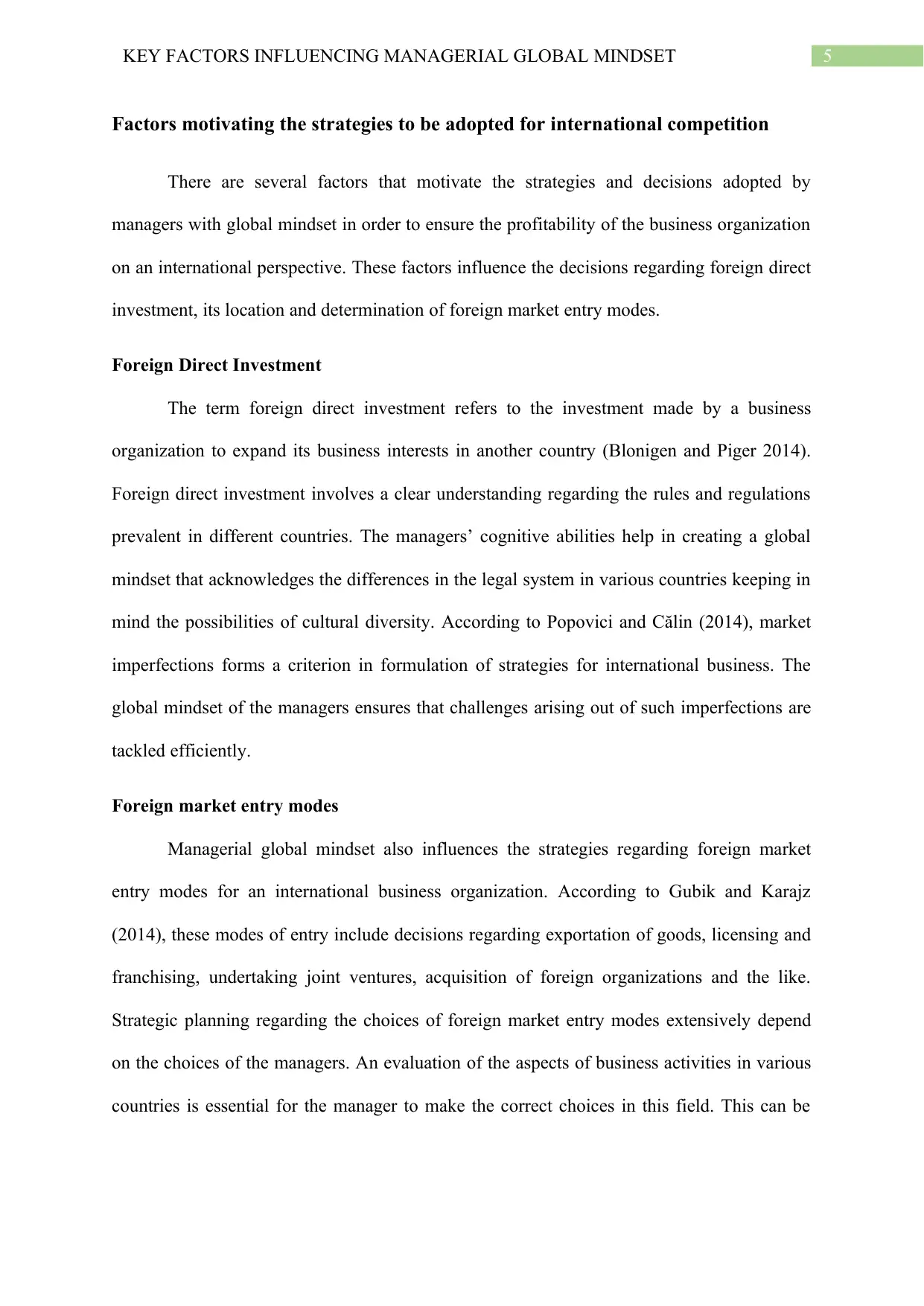
5KEY FACTORS INFLUENCING MANAGERIAL GLOBAL MINDSET
Factors motivating the strategies to be adopted for international competition
There are several factors that motivate the strategies and decisions adopted by
managers with global mindset in order to ensure the profitability of the business organization
on an international perspective. These factors influence the decisions regarding foreign direct
investment, its location and determination of foreign market entry modes.
Foreign Direct Investment
The term foreign direct investment refers to the investment made by a business
organization to expand its business interests in another country (Blonigen and Piger 2014).
Foreign direct investment involves a clear understanding regarding the rules and regulations
prevalent in different countries. The managers’ cognitive abilities help in creating a global
mindset that acknowledges the differences in the legal system in various countries keeping in
mind the possibilities of cultural diversity. According to Popovici and Călin (2014), market
imperfections forms a criterion in formulation of strategies for international business. The
global mindset of the managers ensures that challenges arising out of such imperfections are
tackled efficiently.
Foreign market entry modes
Managerial global mindset also influences the strategies regarding foreign market
entry modes for an international business organization. According to Gubik and Karajz
(2014), these modes of entry include decisions regarding exportation of goods, licensing and
franchising, undertaking joint ventures, acquisition of foreign organizations and the like.
Strategic planning regarding the choices of foreign market entry modes extensively depend
on the choices of the managers. An evaluation of the aspects of business activities in various
countries is essential for the manager to make the correct choices in this field. This can be
Factors motivating the strategies to be adopted for international competition
There are several factors that motivate the strategies and decisions adopted by
managers with global mindset in order to ensure the profitability of the business organization
on an international perspective. These factors influence the decisions regarding foreign direct
investment, its location and determination of foreign market entry modes.
Foreign Direct Investment
The term foreign direct investment refers to the investment made by a business
organization to expand its business interests in another country (Blonigen and Piger 2014).
Foreign direct investment involves a clear understanding regarding the rules and regulations
prevalent in different countries. The managers’ cognitive abilities help in creating a global
mindset that acknowledges the differences in the legal system in various countries keeping in
mind the possibilities of cultural diversity. According to Popovici and Călin (2014), market
imperfections forms a criterion in formulation of strategies for international business. The
global mindset of the managers ensures that challenges arising out of such imperfections are
tackled efficiently.
Foreign market entry modes
Managerial global mindset also influences the strategies regarding foreign market
entry modes for an international business organization. According to Gubik and Karajz
(2014), these modes of entry include decisions regarding exportation of goods, licensing and
franchising, undertaking joint ventures, acquisition of foreign organizations and the like.
Strategic planning regarding the choices of foreign market entry modes extensively depend
on the choices of the managers. An evaluation of the aspects of business activities in various
countries is essential for the manager to make the correct choices in this field. This can be
⊘ This is a preview!⊘
Do you want full access?
Subscribe today to unlock all pages.

Trusted by 1+ million students worldwide
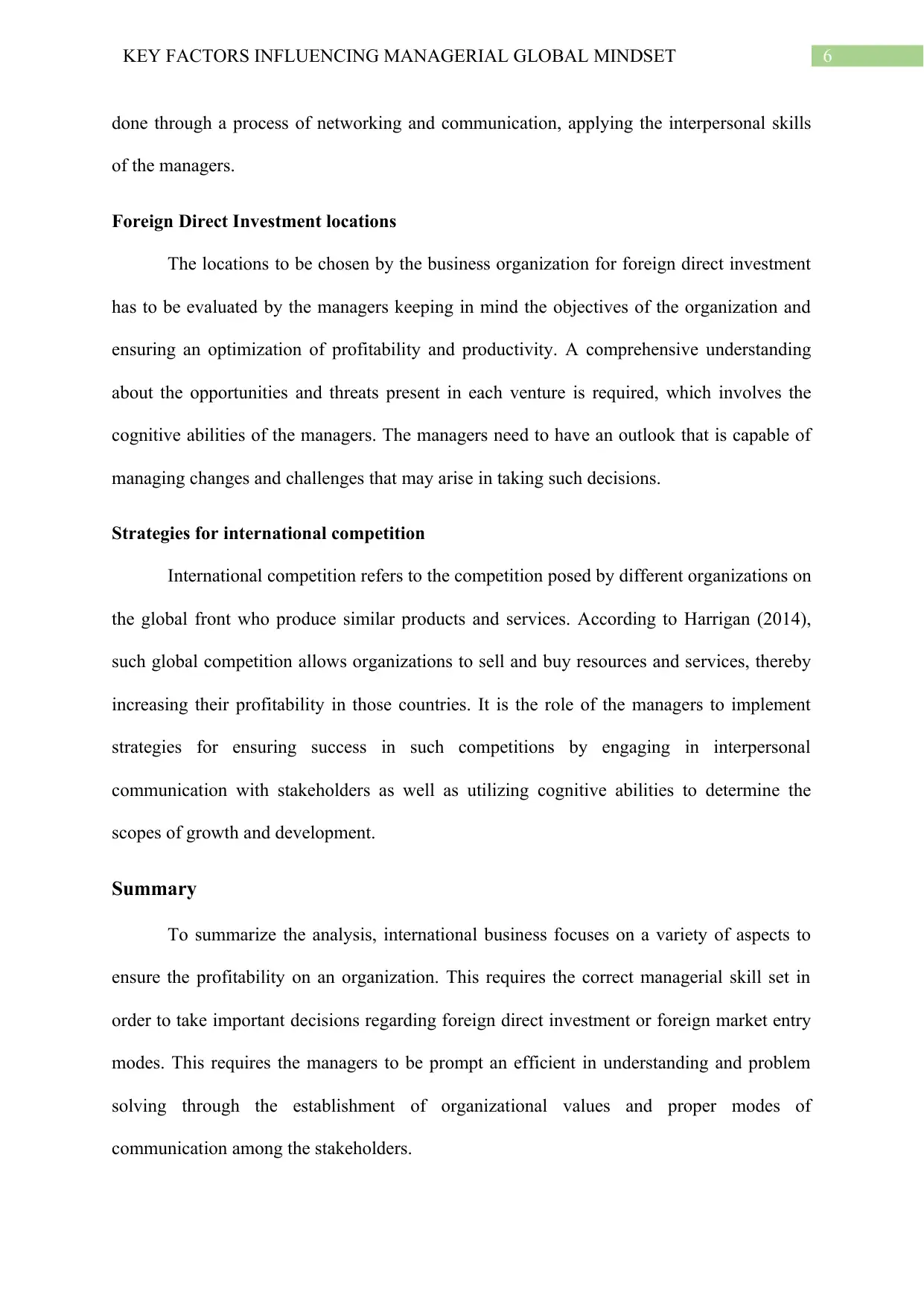
6KEY FACTORS INFLUENCING MANAGERIAL GLOBAL MINDSET
done through a process of networking and communication, applying the interpersonal skills
of the managers.
Foreign Direct Investment locations
The locations to be chosen by the business organization for foreign direct investment
has to be evaluated by the managers keeping in mind the objectives of the organization and
ensuring an optimization of profitability and productivity. A comprehensive understanding
about the opportunities and threats present in each venture is required, which involves the
cognitive abilities of the managers. The managers need to have an outlook that is capable of
managing changes and challenges that may arise in taking such decisions.
Strategies for international competition
International competition refers to the competition posed by different organizations on
the global front who produce similar products and services. According to Harrigan (2014),
such global competition allows organizations to sell and buy resources and services, thereby
increasing their profitability in those countries. It is the role of the managers to implement
strategies for ensuring success in such competitions by engaging in interpersonal
communication with stakeholders as well as utilizing cognitive abilities to determine the
scopes of growth and development.
Summary
To summarize the analysis, international business focuses on a variety of aspects to
ensure the profitability on an organization. This requires the correct managerial skill set in
order to take important decisions regarding foreign direct investment or foreign market entry
modes. This requires the managers to be prompt an efficient in understanding and problem
solving through the establishment of organizational values and proper modes of
communication among the stakeholders.
done through a process of networking and communication, applying the interpersonal skills
of the managers.
Foreign Direct Investment locations
The locations to be chosen by the business organization for foreign direct investment
has to be evaluated by the managers keeping in mind the objectives of the organization and
ensuring an optimization of profitability and productivity. A comprehensive understanding
about the opportunities and threats present in each venture is required, which involves the
cognitive abilities of the managers. The managers need to have an outlook that is capable of
managing changes and challenges that may arise in taking such decisions.
Strategies for international competition
International competition refers to the competition posed by different organizations on
the global front who produce similar products and services. According to Harrigan (2014),
such global competition allows organizations to sell and buy resources and services, thereby
increasing their profitability in those countries. It is the role of the managers to implement
strategies for ensuring success in such competitions by engaging in interpersonal
communication with stakeholders as well as utilizing cognitive abilities to determine the
scopes of growth and development.
Summary
To summarize the analysis, international business focuses on a variety of aspects to
ensure the profitability on an organization. This requires the correct managerial skill set in
order to take important decisions regarding foreign direct investment or foreign market entry
modes. This requires the managers to be prompt an efficient in understanding and problem
solving through the establishment of organizational values and proper modes of
communication among the stakeholders.
Paraphrase This Document
Need a fresh take? Get an instant paraphrase of this document with our AI Paraphraser

7KEY FACTORS INFLUENCING MANAGERIAL GLOBAL MINDSET
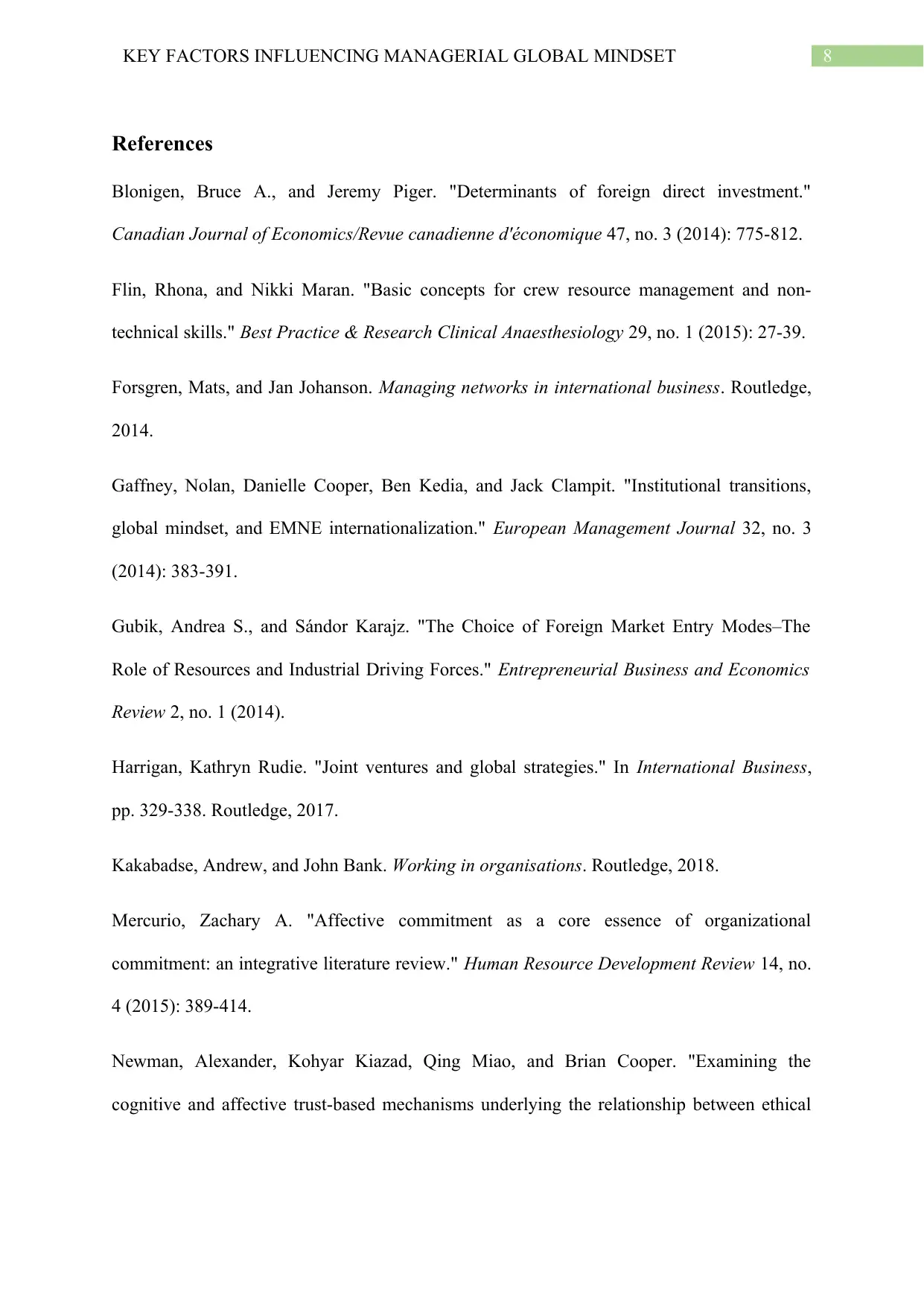
8KEY FACTORS INFLUENCING MANAGERIAL GLOBAL MINDSET
References
Blonigen, Bruce A., and Jeremy Piger. "Determinants of foreign direct investment."
Canadian Journal of Economics/Revue canadienne d'économique 47, no. 3 (2014): 775-812.
Flin, Rhona, and Nikki Maran. "Basic concepts for crew resource management and non-
technical skills." Best Practice & Research Clinical Anaesthesiology 29, no. 1 (2015): 27-39.
Forsgren, Mats, and Jan Johanson. Managing networks in international business. Routledge,
2014.
Gaffney, Nolan, Danielle Cooper, Ben Kedia, and Jack Clampit. "Institutional transitions,
global mindset, and EMNE internationalization." European Management Journal 32, no. 3
(2014): 383-391.
Gubik, Andrea S., and Sándor Karajz. "The Choice of Foreign Market Entry Modes–The
Role of Resources and Industrial Driving Forces." Entrepreneurial Business and Economics
Review 2, no. 1 (2014).
Harrigan, Kathryn Rudie. "Joint ventures and global strategies." In International Business,
pp. 329-338. Routledge, 2017.
Kakabadse, Andrew, and John Bank. Working in organisations. Routledge, 2018.
Mercurio, Zachary A. "Affective commitment as a core essence of organizational
commitment: an integrative literature review." Human Resource Development Review 14, no.
4 (2015): 389-414.
Newman, Alexander, Kohyar Kiazad, Qing Miao, and Brian Cooper. "Examining the
cognitive and affective trust-based mechanisms underlying the relationship between ethical
References
Blonigen, Bruce A., and Jeremy Piger. "Determinants of foreign direct investment."
Canadian Journal of Economics/Revue canadienne d'économique 47, no. 3 (2014): 775-812.
Flin, Rhona, and Nikki Maran. "Basic concepts for crew resource management and non-
technical skills." Best Practice & Research Clinical Anaesthesiology 29, no. 1 (2015): 27-39.
Forsgren, Mats, and Jan Johanson. Managing networks in international business. Routledge,
2014.
Gaffney, Nolan, Danielle Cooper, Ben Kedia, and Jack Clampit. "Institutional transitions,
global mindset, and EMNE internationalization." European Management Journal 32, no. 3
(2014): 383-391.
Gubik, Andrea S., and Sándor Karajz. "The Choice of Foreign Market Entry Modes–The
Role of Resources and Industrial Driving Forces." Entrepreneurial Business and Economics
Review 2, no. 1 (2014).
Harrigan, Kathryn Rudie. "Joint ventures and global strategies." In International Business,
pp. 329-338. Routledge, 2017.
Kakabadse, Andrew, and John Bank. Working in organisations. Routledge, 2018.
Mercurio, Zachary A. "Affective commitment as a core essence of organizational
commitment: an integrative literature review." Human Resource Development Review 14, no.
4 (2015): 389-414.
Newman, Alexander, Kohyar Kiazad, Qing Miao, and Brian Cooper. "Examining the
cognitive and affective trust-based mechanisms underlying the relationship between ethical
⊘ This is a preview!⊘
Do you want full access?
Subscribe today to unlock all pages.

Trusted by 1+ million students worldwide
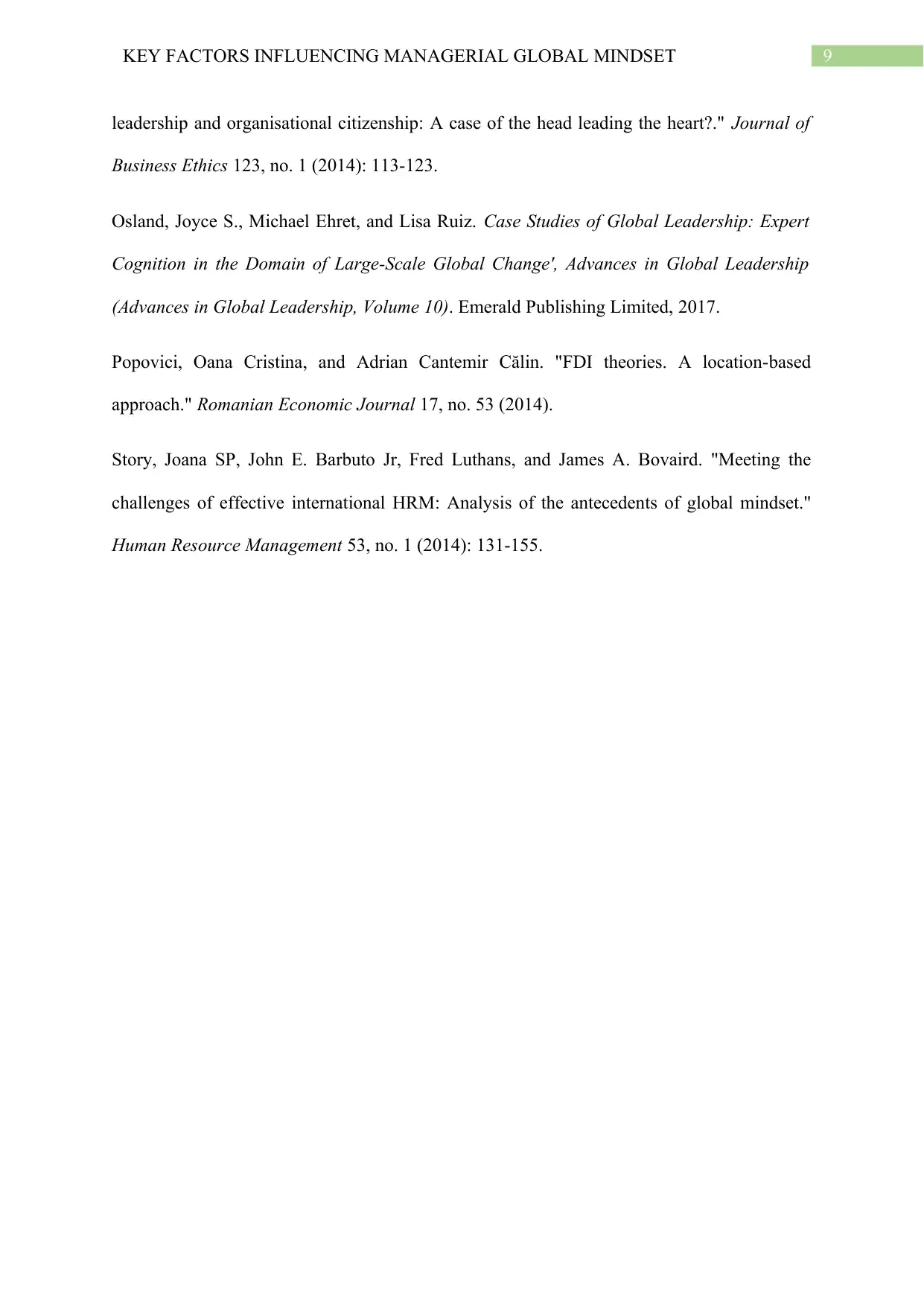
9KEY FACTORS INFLUENCING MANAGERIAL GLOBAL MINDSET
leadership and organisational citizenship: A case of the head leading the heart?." Journal of
Business Ethics 123, no. 1 (2014): 113-123.
Osland, Joyce S., Michael Ehret, and Lisa Ruiz. Case Studies of Global Leadership: Expert
Cognition in the Domain of Large-Scale Global Change', Advances in Global Leadership
(Advances in Global Leadership, Volume 10). Emerald Publishing Limited, 2017.
Popovici, Oana Cristina, and Adrian Cantemir Călin. "FDI theories. A location-based
approach." Romanian Economic Journal 17, no. 53 (2014).
Story, Joana SP, John E. Barbuto Jr, Fred Luthans, and James A. Bovaird. "Meeting the
challenges of effective international HRM: Analysis of the antecedents of global mindset."
Human Resource Management 53, no. 1 (2014): 131-155.
leadership and organisational citizenship: A case of the head leading the heart?." Journal of
Business Ethics 123, no. 1 (2014): 113-123.
Osland, Joyce S., Michael Ehret, and Lisa Ruiz. Case Studies of Global Leadership: Expert
Cognition in the Domain of Large-Scale Global Change', Advances in Global Leadership
(Advances in Global Leadership, Volume 10). Emerald Publishing Limited, 2017.
Popovici, Oana Cristina, and Adrian Cantemir Călin. "FDI theories. A location-based
approach." Romanian Economic Journal 17, no. 53 (2014).
Story, Joana SP, John E. Barbuto Jr, Fred Luthans, and James A. Bovaird. "Meeting the
challenges of effective international HRM: Analysis of the antecedents of global mindset."
Human Resource Management 53, no. 1 (2014): 131-155.
Paraphrase This Document
Need a fresh take? Get an instant paraphrase of this document with our AI Paraphraser

10KEY FACTORS INFLUENCING MANAGERIAL GLOBAL MINDSET
1 out of 11
Related Documents
Your All-in-One AI-Powered Toolkit for Academic Success.
+13062052269
info@desklib.com
Available 24*7 on WhatsApp / Email
![[object Object]](/_next/static/media/star-bottom.7253800d.svg)
Unlock your academic potential
Copyright © 2020–2025 A2Z Services. All Rights Reserved. Developed and managed by ZUCOL.





